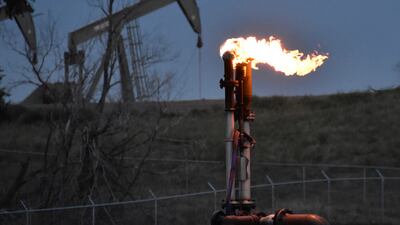Live updates: Follow the latest news on Cop28
The oil and gas industry's pledge at the Cop28 climate conference to reduce methane emissions has been hailed as a positive step for climate action, but concerns loom large over its implementation amid calls for swifter measures.
On Saturday, 50 oil and gas companies, including Saudi Aramco, ExxonMobil and Shell, signed the Oil and Gas Decarbonisation Charter (OGDC), which calls for net-zero emissions by 2050 or before and near-zero upstream methane emissions by the end of the decade.
“It's an impressive achievement to bring together so many companies, including several national and US oil companies, which did not previously have net-zero goals,” Robin Mills, chief executive of Qamar Energy, told The National.
“It's essential that we now see rapid progress on the 2030 methane commitments.”
After carbon dioxide emissions, methane is the second-largest contributor to climate change, caused by humans. It is a greenhouse gas that warms up more than 80 times faster than carbon dioxide.
Reducing the international output of methane emissions is the most effective and least disruptive way to slow down the increase in global temperatures over the next few decades, climate experts say.
The oil and gas industry is estimated to account for up to a quarter of human-caused methane emissions.
Several environmental groups and think tanks have criticised the latest pledge from the fossil fuel industry for not going “far enough”.
“The OGDC is voluntary and doesn’t go anywhere near far enough in its scope by focusing on operations only,” said Helen Harwatt, senior research fellow in the environment and society centre at Chatham House.
“Also, having a goal for reducing emissions intensity doesn’t necessarily translate into an absolute emissions reduction if there isn’t a target for that too.”
Melanie Robinson, global climate programme director at the World Resources Institute, said it was “encouraging” to see some national oil companies set methane reduction targets for the first time.
“However, most global oil and gas companies already have stringent requirements to cut methane emissions. Strong measures to verify progress are crucial to holding oil and gas companies accountable,” Ms Robinson said.
On Saturday, a group of organisations, including Bloomberg Philanthropies and the Environmental Defence Fund, announced an initiative to track the progress of oil and gas companies in lowering emissions of the greenhouse gas.
The collaboration, which also includes the International Energy Agency, the UN Environment Programme and RMI, will provide data, policy and country-level engagement.
The announcement at Cop28 is the latest in a series of actions taken at a global level to slash methane emissions.
In 2021, more than 150 countries participated in the Global Methane Pledge, which aims to achieve a reduction of methane emissions by at least 30 per cent below 2020 levels by 2030.
Addressing the pledge, Angela Wilkinson, secretary general and chief executive of the World Energy Council, said: “Let’s recognise this commitment as necessary and avoid perfection being the enemy of the good.”
“The debates about ‘phase down versus phase out’ reflect extreme polarisation of 'us versus them'. It might provide great theatre and headlines … but it is a most unhelpful leadership situation,” Ms Wilkinson told The National.
“Want it or not, the world needs more energy for sustainable development for decades to come,” she said.
The Cop28 event is happening against the backdrop of two major geopolitical conflicts, an economic slowdown and rising inequality, all of which have raised concerns about energy security in many countries.
Russia’s invasion of Ukraine last year knocked off a large part of Europe’s gas supplies, prompting many countries to secure long-term natural gas agreements with the US and the Gulf.
That resulted in higher natural gas prices, forcing many developing economies to increase their purchases of coal.
Meanwhile, the IEA expects global demand for oil and gas to peak by 2030 amid rising adoption of renewable energy technology and electric vehicles.
In a report last month, the agency said that with geopolitical instability and rising demand, some investment in the production of fossil fuels would be needed to ensure the security of energy supply.
“Prefer it or not, renewables need other clean energy and material friends to scale. Like it or not, not all energy needs and uses can be electrified,” Ms Wilkinson said.
Cutting oil and gas emissions from supply and use “as quickly as possibly” is essential, and it means putting in place more carbon capture solutions and transforming end uses and behaviours, she added.


























